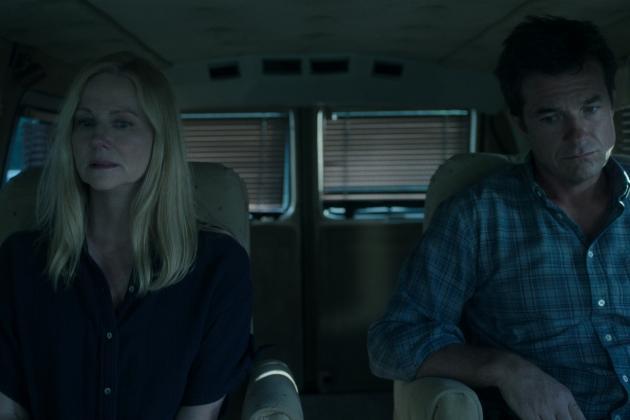
This article contains spoilers for the final episode of “Ozark.”
Say this much for the final moments of “Ozark”: They speak to the show’s sense of its own importance.
More from Variety
After four seasons, the Byrde family’s saga came to its conclusion with the launch of the drama’s final set of episodes on Netflix — or, at least, the part of the story we as viewers see concluded. The implication of those last seconds is that Marty and Wendy, the amoral husband and wife played by Jason Bateman and Laura Linney, will indeed accomplish everything they want, and will do so with the buy-in of their son Jonah (Skylar Gaertner).
In the finale, the Byrdes throw a charity gala that represents their emergence from the depths they’ve occupied to become, once more, legitimate citizens. After the event, their last real threat emerges: A private investigator (Adam Rothenberg) who reappears to confront the couple. But Jonah manages to get the drop on him, with a shot ringing out and the family’s triumph sealed as the camera cuts to black.
From a filmmaking perspective, this seems like a spin on “The Sopranos” finale, but on a show that lacks the courage of its convictions. (The “Ozark” finale was directed by Bateman, who has won an Emmy for his work behind the camera.) Not literally showing the final act in the Byrdes’ rise suggests ambiguity, but Bateman makes sure to leave in audio of the gunshot — just in case viewers were confused.
And narratively, this final killing completes the show’s rather schematic understanding of who the Byrdes are and what they want. We have been told, throughout, that Marty and Wendy were relentlessly laundering money not merely to outrun debts to organized crime (as was literally true) but to build a future for their children. Now, one of their children has conceded that their parents had the right idea.
In the past, I’ve written critically about “Ozark,” a show that is relentlessly watchable and often a wicked sort of fun. But it often presented itself as a “Breaking Bad” with the ideas leached out — all pulsating action, not much more to grab onto. And what I see as a tendency to lean on cliché about the potential criminality that lurks in the hearts of men and women, fans might well call a willingness to play in bold and elemental terms. A show about good and evil would have more gradations than “Ozark,” which is about evil, plain and simple. The show relishes showing us Wendy and Marty’s greed, desperation, and willingness to do anything to get ahead; its conclusion, with the final corruption of the perennially ambivalent Jonah, is the ultimate coup.
It also doesn’t really work: For one thing, the finale leaves daughter Charlotte (Sofia Hublitz) out of the family equation, as though she doesn’t matter to the story. She’s shown in reverse, standing by her brother as he aims his gun; the implication is that she approves, but it’s clumsily executed. That awkwardness may be owed to the fact that neither Byrde child did matter much to the story until they could be used to prove a Big Point about generational wealth and generational violence. They were far less important to the story, certainly, than Julia Garner’s Ruth Langmore, the unfortunate young woman whose aptitude for criminality made her the true heir to the Byrde parents before she was killed in retribution for a murder she’d committed in retribution for… and so on.
Ruth running out of luck just as the upper-class Byrdes stumble onto yet greater fortune is, by a certain literal way of thinking, the way of the world. And, if it aims for nothing else, “Ozark” wants, badly, to express this cynical point-of-view. The trouble is that it finds itself with little more to say than “them’s the breaks, huh?” This expresses itself through sermonizing, like when Rothenberg’s character — thinking he’s about to ruin the Byrdes — tells the pair that they can’t just reinvent themselves as American royalty, and that “the world doesn’t work that way.” It’s a line that’s written only to serve as set-up: Wendy’s reply (“Since when?”) is the last line of dialogue we hear. The show’s closing argument, that the wealthy create their own reality, has been better expressed, frankly, through Ruth’s grinding struggle upward over the preceding seasons.
The final moments feel “inevitable,” and lack the crispness of surprise. Ruth gets drawn-out sentimental moments with various members of the Byrde family in the time leading up to her death, a valedictory shift in her bearing that makes clear that we are about to say goodbye. (Of course, her fate was sealed when she impulsively knocked off a key cartel member in a revenge killing, but there seemed potential for a bit more suspense when watching in the moment.) And we ought to have known the Byrdes were invincible when a massive car wreck they’re in — one teased at the beginning of the season — leaves the family unscathed and Wendy more convinced than ever of their righteousness.
That last detail intrigues: Wendy, as played by Linney, is the show’s richest character (followed closely by Ruth, who could more often be used as a device to contrast the classes in “Ozark’s” milieu than a fully-rounded figure). Wendy’s expressed belief that the family is on the path to a sort of transcendent American greatness is a note that remained underexplored to the show’s conclusion.
Had that been drawn out more clearly, we might have a better understanding of what Jonah and Charlotte believed they were signing up for as they committed to the family’s way of life. Instead, what we get is “Since when?” — a line written with a sort of smirking certitude. “Ozark” ends by congratulating itself for having accurately documented the state of American life, all within an invented reality that was even more rigged in the Byrdes’ favor than real life might have been.
Best of Variety
Sign up for Variety’s Newsletter. For the latest news, follow us on Facebook, Twitter, and Instagram.




